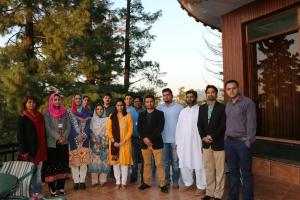“It was the first time I attended a training about Internet rights. I had very little idea about this topic before attending, but this two-day extensive workshop titled ‘Internet Rights are Human Rights’ helped me at great length to better understand these rights, especially in online spaces.”
-Muhammad Ali Rana, Assistant Professor, Media Studies Department, Fatima Jinnah Women University.
Ali Rana was among ten participants selected for the Internet Rights are Human Rights (IRHR) workshop held with human rights defenders, women’s rights defenders, journalists and members of academia, as part of the project Advocacy for Change through Technology in India, Malaysia and Pakistan (IMPACT). The project is using the Internet Rights are Human Rights curriculum to provide human rights defenders with knowledge, tools, networks and support to respond to these violations, and to communicate more safely online.

The training, organised by Bytes for All, Pakistan (B4A) and the Association for Progressive Communications (APC), took place in Rawalpindi between 17 and 18 October 2015. It focused on international rights regimes and local legislations related to restrictions on freedom of expression, access to information, privacy-related issues and online surveillance, which were discussed during workshop activities. Particularly the discussions during the analysis of case studies focused on local context.
“The agenda of the workshop was quite rich and informative. However, two days was not enough time; it should have been at least three days or more,” said Khurram Gill, a human rights defender working on minorities rights in Faisalabad. Similar thoughts were also shared by other participants, including assistant professor from Fatima Jinnah University Dr. Musarrat Amin.
“The agenda of the workshop was quite rich and informative, however, two days was not enough time, it should have been at least three days or more” said Khurram Gill, a human rights defender working on minorities rights in Faisalabad. Similar thoughts were also shared by other participants, including Assistant Professor from Fatima Jinnah University Dr. Musarrat Amin.
Among the highlights of the sessions, a discussion regarding online campaigning to generate support for missing persons in Pakistan created a heated debate. Cultural and religious values were prominent in the discussions, including through case studies on access to the internet by LGBT individuals and communities in Pakistan.
One participant expressed the view that domestic laws are according to the teachings of Islam and that it was legitimate for the Pakistani telecommunication regulator (PTA) to restrict LGBT websites and social media accounts. This participant believed that cultural values vary across countries, and in Islamic societies, there is not space for LGBT activities.
Several participants provided a counter argument that the right to freedom of expression of LGBT individuals and communities should not be suppressed, because their problems are, after all, problems of the same society that we all belong too. The isolation of LGBT individuals and communities will not solve anything, rather it will further aggravate the situation, especially when it comes to their access to basic needs, such as health, education, work, etc.

As part of a post-training evaluation, participants expressed their satisfaction with the training methodologies, healthy discussion, and the level of knowledge of the trainers, and command on the respective modules. The trainers of the workshop included Sadaf Khan, Haroon Baloch, Fahad Desmukh and Muhammad Arsalan Ashraf. Country Coordinator IMPACT Tehmina Zafar supervised the training.
B4A is planning to hold second IRHR training in this series in the month of December and has already started on adapting the programme reflecting learnings from the experience of first training. Secure online communication trainings are also in progress, and so far B4A has conducted five one-day sessions with different stakeholders, including HRDs, journalists, and others, to help them improve their digital security practices so that they are able to carry out their work with less risk.